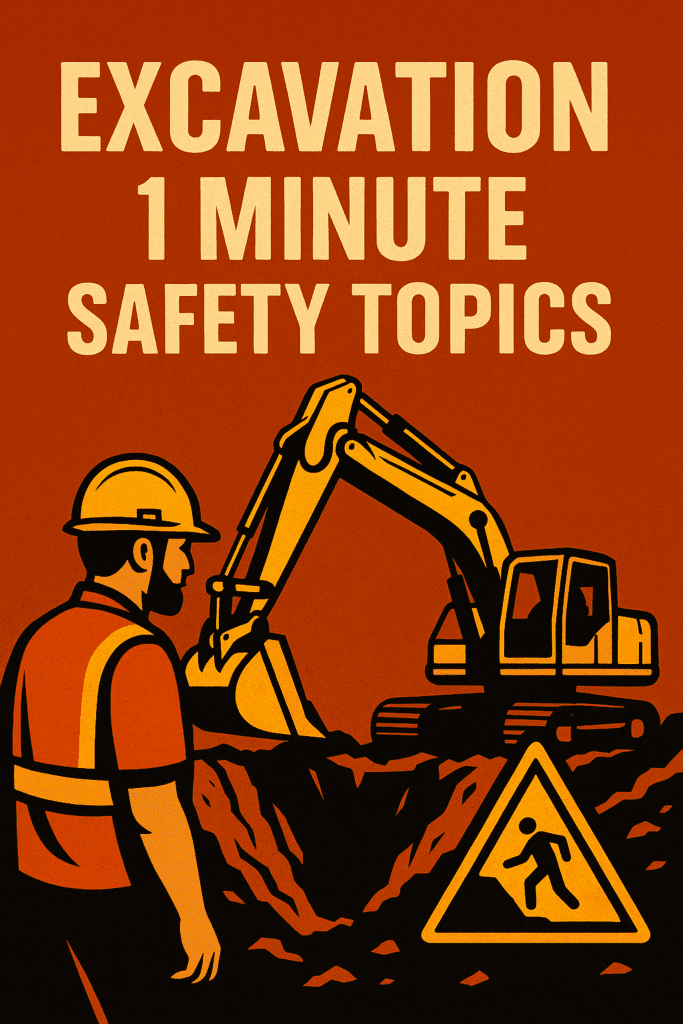
Excavation 1 Minute Safety Topics
Picture this: workers are inside a trench, everything seems fine, but suddenly the soil shifts and collapses. In just seconds, people are trapped. Sadly, this isn’t an exaggeration—cave-ins kill and injure workers every year around the world.
Excavation safety is one of the most important subjects in construction and utility projects. Yet, long lectures don’t always stick in workers’ minds, especially before a busy shift. That’s why 1-minute safety topics—quick, to-the-point reminders—are so effective.
In this guide, we’ll explore why excavation safety is critical, the benefits of short talks, and the top 10 excavation safety topics you can cover in just 60 seconds each. By the end, you’ll see how these small safety reminders can make a huge difference in preventing big accidents.
What Are 1-Minute Safety Topics?
Think of them as safety snacks—short, digestible messages that keep workers alert without overwhelming them. Unlike full training sessions, 1-minute talks are:
- Brief – One key message at a time.
- Targeted – Focused on specific hazards.
- Practical – Easy for workers to apply immediately.
These talks are usually delivered right before work starts, often during the morning briefing or toolbox talk. They’re perfect for excavation work, where hazards change daily depending on soil, weather, and equipment conditions.
Why Excavation Work Is Risky
Excavation looks simple—just digging soil, right? Wrong. The dangers are hidden but severe.
- Cave-ins: The biggest killer. Soil is heavy; one cubic yard can weigh more than a car.
- Struck-by hazards: Workers can be hit by falling soil, tools, or equipment.
- Utility strikes: Digging into underground power lines, gas pipes, or water mains.
- Hazardous atmospheres: Excavations can accumulate toxic gases or lack oxygen.
- Falls: Workers and equipment can fall into open trenches.
These dangers are why regulatory bodies like OSHA (29 CFR 1926 Subpart P) emphasize strict excavation safety rules.
Benefits of 1-Minute Excavation Talks
Why not just stick to formal training sessions? Because daily reminders matter.
- Refresh memory: Safety rules fade without reinforcement.
- Adapt to conditions: Each day brings new soil, weather, or utility risks.
- Engage workers: A quick interactive talk keeps them alert.
- Build culture: Shows management truly cares about safety.
A single minute of talking can prevent hours of rescue and tragedy.
Top 10 Excavation 1-Minute Safety Topics
Now let’s break down 10 practical topics you can deliver in one minute each.
Topic 1: Pre-Work Inspections
Before anyone steps into a trench, inspect the site. Look for cracks in the soil, standing water, nearby heavy equipment, or anything unusual.
Quick message: “Check the trench before you enter—today’s soil isn’t yesterday’s soil.”
Topic 2: Competent Person Requirement
Every excavation site must have a competent person—someone trained to identify and correct hazards. They inspect trenches daily and after weather events.
Quick reminder: “No competent person, no entry.”
Topic 3: Cave-In Protection
Trenches deeper than 5 feet need protective systems:
- Sloping – Cutting back trench walls at an angle.
- Shoring – Using supports to hold soil.
- Shielding – Trench boxes for worker protection.
One-liner: “No protection, no work—it’s that simple.”
Topic 4: Access and Egress
Workers must have ladders, ramps, or steps within 25 feet of travel. Ladders must extend 3 feet above the trench.
Message: “If you can’t get out quickly, you shouldn’t be in.”
Topic 5: Utility Line Identification
Always locate underground utilities before digging. Call utility services and mark the area.
Line to say: “Digging blind is digging dangerous.”
Topic 6: Hazardous Atmosphere Testing
Deep or confined excavations may have low oxygen, methane, or toxic gases. Always test the air before entry.
Quick tip: “If the air isn’t tested, don’t trust it.”
Topic 7: Heavy Equipment Awareness
Excavators, dump trucks, and loaders work close to trenches. Workers must keep safe distances and use spotters.
Reminder: “Stay visible—machines can’t see you.”
Topic 8: Water Accumulation Risks
Water weakens trench walls and leads to cave-ins. Use pumps and slope drains to control water.
Simple phrase: “Water in trenches means danger.”
Topic 9: Edge Protection and Barricades
Barricade trenches to prevent people or equipment from falling in. Keep spoil piles at least 2 feet back from edges.
Message: “Protect the edge—save a life.”
Topic 10: Emergency Response Preparedness
If something goes wrong, workers must know what to do. Rescue equipment and first aid must be ready.
Closing line: “Don’t just plan to dig—plan to rescue.”
How to Deliver 1-Minute Talks Effectively
Delivering these talks is just as important as the content. Here’s how to make them stick:
- Keep it short – Don’t drag beyond 60 seconds.
- Be practical – Focus on today’s hazards.
- Use real stories – Share near misses or incidents.
- Ask questions – Example: “Where’s today’s ladder?”
Mistakes to Avoid
Even short talks can fail if not done right.
- Overloading workers – Stick to one topic.
- Using technical jargon – Keep it simple.
- Skipping participation – Talks should be interactive.
- Being inconsistent – Daily talks matter more than random ones.
Conclusion
Excavation work is dangerous, but the risks can be managed. By using 1-minute safety topics, you keep workers alert, engaged, and prepared. These talks are small investments of time with massive returns in safety.
Remember this simple truth: “One minute of prevention can save a lifetime of regret.”
Material Lifting 1 Minute Safety Topics
Electrical 1 Minute Safety Topics
Hot Work 1 Minute Safety Topics
Work at Height 1 Minute Safety Topics
Slips Trips and Falls Prevention TBT
FAQs
1. What’s the most common excavation hazard?
Cave-ins, which cause the majority of excavation-related fatalities.
2. How often should safety talks be given?
Daily, ideally at the start of each shift.
3. Who should deliver these talks?
Supervisors, safety officers, or even trained workers on rotation.
4. Do 1-minute talks replace formal training?
No, they supplement training and reinforce key lessons.
5. What should every excavation site have?
Protective systems, competent person inspections, safe access, and an emergency plan.